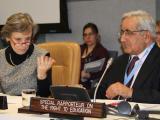- عربي
- 中文
- English
- Français
- Русский
- Español
Experts say countries are falling short in efforts to end violence and secure quality education for women and girls

New York, 1 March 2011 - “Educate a boy, and you educate an individual. Educate a girl, and you educate a community,” so goes the oft-quoted African proverb.It is backed by empirical evidence. During a panel discussion on 1 March at the United Nations in New York on tackling violence to secure quality education for women and girls, participants heard that research in some countries shows that an educated girl reinvests 90 percent of her income in her family, compared to 35 percent for boys.
Studies in some countries have also shown that if just 20 percent more girls were enabled to obtain secondary education, the national economy would grow by three percent.While acknowledging the social and economic benefits of educating girls, panellists concurred that non-discrimination in the exercise of human rights, including the right to education, was paramount.
“The question of equality between men and women is fundamental regardless of the benefits [the education of women] may bring,” said Kishore Singh, the Special Rapporteur on the right to education.Indeed, education should empower women and girls to fully realise all human rights, not least freedom from violence.
“Education, education, education” is one of the recommendations, said Rashida Manjoo, the Special Rapporteur on violence against women, its causes and consequences, that she gives to governments to tackle violence against women.No country, she observed, can claim to be addressing effectively the challenges of gender stereotyping, socialisation and lack of accountability that serve to exacerbate violence against women. Part of the problem is the lack of political will. “It’s not only about passing a law or having a policy that one then showcases. It’s having the deep political will to change the society that one lives in; to address structural inequalities and discrimination,” she said.Other panellists also highlighted as a major challenge the inadequate response to violence against women and girls, within and outside the school environment.
“Still today, 87 countries do not have specific legislation prohibiting violence against children, including girls in the school system. Lack of mechanisms to provide advice and file complaints, absence of guidance for professionals on reporting on incidents of violence, as well as weak psychological support to victims is a widespread reality,” said Marta Santos Pais, the UN Special Representative of the Secretary-General on Violence against Children.All international human rights treaties affirm the principle of non-discrimination and equality between women and men, and of protection from violence.“As signatories to these human rights conventions, States must be held accountable to prevent and punish acts of violence, and to provide redress to victims,” said Ivan Simonovic, Assistant Secretary-General for Human Rights.
“It is imperative for the international community to consistently work with States to change the culture of discrimination which renders women and girls vulnerable and unsafe in school environments,” he added.The panel was also addressed by Dragoljuba Bencina, State Secretary in the Ministry of Foreign Affairs of Slovenia; Maud de Boer-Buquicchio, Deputy Secretary General of the Council of Europe; and Sharon Elliott of ActionAid International.It was organised by the Office of the High Commissioner for Human Rights and the Office of the Special Representative of the Secretary-General on Violence against Children with the support of Slovenia in the context of the Commission on the Status of Women, a UN body that promotes gender quality and the advancement of women.

